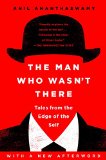Summary | Excerpt | Reviews | Beyond the book | Read-Alikes | Genres & Themes | Author Bio

My Life with Multiple Personality Disorder
by Robert B. OxnamThis is without doubt the most extraordinary and compelling memoir that I have read in a long time. In fact, it might possibly be the most extraordinary book per se. If this was a work of fiction it would be interesting, but as an apparently true memoir it is riveting.
Multiple personality disorders (MPD) have come in for a lot of bad press over the years. Some in the medical community don't believe they exist at all, many believe they are over-diagnosed, and some baulk at the suggestion that they are caused by the need to suppress a very significant childhood trauma, usually of a sexual nature - memories that are "recovered" during treatment.
Many readers have also been burned recently by memoirs that are not all that they purport to be, the most recently notorious being A Million Little Pieces, so you would be right to have your cynicism antennae well attuned when considering whether to believe the story told in A Fractured Mind.
I certainly had doubts, but the more I read, and the more I found out about Robert Oxnam, a distinguished and well-respected scholar, it struck me that I couldn't see one possible reason why he would invent such a story - in publicly telling it he has nothing to gain and a great deal to lose. Oxnam himself was cynical, to put it mildly, about his diagnosis. When he staggered out of his psychiatrist's office one day having been told that for most of the past hour Dr Smith had been talking with "Tommy", a personality inside Oxnam's head, Oxnam's knee-jerk reaction was to write Dr Smith off as "a quack, inventing stories to keep pathetic souls writing checks." However, over the next few days he did what he does best and researched MPD, and the more he read the more he realized his life fitted the pattern.
When he returned for his next appointment, Dr Smith explained that every case of MPD he knew about had been caused by traumatic childhood experiences which, in some children, cause the mind to fracture with some parts absorbing the pain while other parts survive by separating themselves from it, eventually coming to live quite separate lives with separate experiences and separate memories. In short MPD is "the ultimate survival mechanism of intelligent children faced with unbearable memories."
As a child Robert Oxnam was intensely driven to succeed and be a credit to his parents, in particular to his father, G Bromley Oxnam, President of DePauw University from 1928-1936. He grew into a very successful academic, gaining much public distinction and a whole host of professional accomplishments, but inwardly he struggled with self-doubt, blackouts and obsessive behaviors including bulimia and alcoholism. By the late '80s things were reaching crisis point; his wife had left him, his work was suffering, he was increasingly beset by blackouts, appeared to be talking to himself a lot, and discovered that he'd been shoplifting from his favorite store for years but had no memories of having done so. He was also sometimes hearing voices, and the voices told him he was the worst person who ever lived.
A friend urged him to see a psychiatrist for his alcoholism. After some months, Oxnam was just about to give up on treatment, believing it to be a waste of time, when Dr Smith "met" an angry teenage boy named Tommy who lived inside a "castle" inside Oxnam's head.
Over a period of many months other personalities living in the castle came to the fore:
Yes, I know it all sounds a little far-fetched but all I can say is read it! A Fractured Mind is told from the 1st person perspectives of the different personalities in a style that reads like an adventure story which, in essence, is what it is - an adventure into one very extraordinary brain. When asked on New York Public Radio how he managed to write in these different personalities, especially considering that today the eleven have been merged into three (Robert, teenage Bobby and buddhist Wanda), Oxnam explains:
What I essentially did over a two week period is to say to each of those inner personalities, this is your chance, tell your story give it to us from your perspective. It was a bit like being a narrator, and a bit like being a medium and almost a voyeur in that I was also listening to memories that I had myself never processed before. and of course all of it added up to the greatest therapy in the world, the book had its purpose long before publication and that is asking myself what really made me tick and how do I become a more healthy individual."
Oxnam is well aware that his story is a surreal one and that it will be difficult for people to believe it. When asked about the controversy surrounding recovered memories Oxnam says simply, "I'm not a therapist. I can only tell my own story. I do know that there was no implanting whatsoever. Each time that a personality emerged it was never a suggestion, it was never 'Wouldn't it be good if this happened,'". His psychiatrist, Dr Smith, also confirms that he "would never suggest details" and that "no sensible clinician would do so". Speaking on NYPR Oxnam said:
"If I had not gone through this splitting process it would have been very hard to have had an outside professional life, I would probably would have ended up in an institution or in a vegetative state, so in that sense it was a coping mechanism .... People who have this disorder are not crazy they are trying to respond to outside trauma, it's not genetic and in many ways it seems like an extreme response but it's a way for them to stay alive"
Oxnam's story is almost unbelievable for a "normal" person to take in. Is it possible that different personalities in his head could not only have different knowledge but different beliefs and be of different ages? For example, when out sailing Bobby is in charge, but Bobby doesn't know a thing about Asia, which means that if Oxnam is asked a question about his area of specialty he simply cannot answer it.
Is it possible that Oxnam could have zero memory of what he did for three days on a trip to Taiwan from which he returned with cigarette burns on his arms? Even more extraordinary, is it really possible that the personality known as Bobby could have had an affair with a woman he meets rollerblading in the park without his wife, let alone the dominant personality, Robert, knowing? The mind boggles but if you read A Fractured Mind you might find yourself a believer too!
It is worth noting that Oxnam does not excuse his past behavior by blaming it all on MPD. Nor does he attempt to sensationalize - he gives broad brush strokes of the abuse that he suffered but does not dwell on it. In other words, he avoids the "tabloid" approach and focuses instead on how his condition effected his life and his efforts to achieve integration. Another factor that sets this memoir apart from other MPD accounts is that most have been written by or about women who have tended to come across as passive, easily led, attention seekers. Oxnam could not be described as anything but high functioning and has many avenues open for him with which to gain attention, thus he makes an ideal poster-boy for MPD.
Speaking of Bobby's affair, Oxnam says, "I'm not going to sit here and say, 'No, it wasn't me. I didn't have the affair.' Of course it was me, part of the package me that exists." Robert's wife forgave him but freely admits that living with a committee of personalities is challenging. For Robert it has its challenges too. For example when 18-year-old Bobby (one of the 3 remaining personalities) decides to go rollerblading for five hours in Central Park, Oxnam's 63 year-old body feels it the next day! Incidentally, "Bobby" is well known in Central Park, after all there aren't that many 60-year-old men who skate around with as many as three bottles balanced on their head, earning him the nickname "Bottleman", but causing embarrassment to Robert when he is spotted by people he knows from other contexts!
![]() This review
first ran in the February 7, 2007
issue of BookBrowse Recommends.
This review
first ran in the February 7, 2007
issue of BookBrowse Recommends.

If you liked A Fractured Mind, try these:

by Eli Sanders
Published 2017
A Pulitzer Prize–winning reporter's gripping account of one young man's path to murder - and a wake-up call for mental health care in America

by Anil Ananthaswamy
Published 2016
A tour of the latest neuroscience of schizophrenia, autism, Alzheimer's disease, ecstatic epilepsy, Cotard's syndrome, out-of-body experiences, and other disorders—revealing the awesome power of the human sense of self from a master of science journalism
Your guide toexceptional books
BookBrowse seeks out and recommends the best in contemporary fiction and nonfiction—books that not only engage and entertain but also deepen our understanding of ourselves and the world around us.